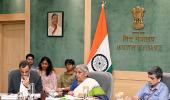India and Russia on Tuesday set a target of $100 billion in annual trade volume by 2030 and vowed to develop a robust bilateral payment settlement mechanism using national currencies.

The two sides also inked a total of nine agreements to further broadbase cooperation in a range of areas including in the economic domain following summit talks between Prime Minister Narendra Modi and Russian President Vladimir Putin.
Modi paid a two-day visit to Russia, his first to the country since the start of the war in Ukraine.
"The major thrust of the discussion was on economic engagement.
"A significant component of it was also devoted to how the partnership between India and Russia can also give fillip to 'Make in India' and other manufacturing partnerships," Foreign Secretary Vinay Kwatra said at a media briefing.
Kwatra said PM Modi spoke about the need to broadbase the overall trade basket and called for greater market access for Indian goods in Russia both in agricultural and industrial sectors.
"The two leaders also focused on important areas in the economic domain that link with the growth of different sectors in both countries, in particular fertiliser supplies from Russia to India, which is directly linked to the crop production and the farmers' yield in India," he said.
"In terms of specific targets, the two leaders have set a new trade target of $100 billion by 2030," Kwatra said.
The current bilateral trade volume is around $60 billion.
The two leaders also spoke about the need to move forward on the India-Eurasian Economic Union trade and Goods Agreement.
"We have had one round of discussions between the two countries and it is expected that this will be expedited in months ahead," Kwatra said.
The two sides also released a 'leaders' joint statement on the development of strategic areas of Russia-India economic cooperation for the period up to 2030' that laid a roadmap for expansion in economic ties.
The document listed development of a bilateral payment settlement system using national currencies as a priority area.
It also listed consistent introduction of digital financial instruments for mutual payment settlements.
It said identified development of cooperation in key energy sectors, including nuclear energy, oil refining and petrochemicals and expanded forms of partnership in the field of energy infrastructure as priority areas.
It also laid emphasis on facilitation of mutual and international energy security taking into account the prospects of global energy transition.
A joint statement also noted that both sides agreed to continue working together to promote a bilateral settlement system using national currencies.
"The sides agreed to continue consultations for interoperability of their financial messaging systems."
"They noted the importance of finding mutually acceptable solutions for issues of insurance and reinsurance for facilitating further enhancement in bilateral trade," it said.
"For eliminating the non-tariff/tariff barriers in trade, including protective measures and administrative barriers, the leaders appreciated the initial meeting in March 2024 to commence full negotiations for a Free Trade Agreement on goods between India and the Eurasian Economic Union," it said.
The leaders also directed their relevant officials to explore the possibility of commencing negotiations for signing a bilateral free-trade agreement in services and investments.
India and Russia also reiterated the importance of robust and wide ranging cooperation in the energy sector as a significant pillar of the Special and Privileged Strategic partnership.
"In this context, the sides noted the continued special importance of bilateral trade in energy resources and agreed to explore new long term contracts," the joint statement said.
"The sides appreciated the ongoing cooperation in the coal sector and agreed to explore the possibility for further increasing the supply of coking coal to India, and the opportunities of exporting anthracite coal from Russia to India," it said.











 © 2025
© 2025